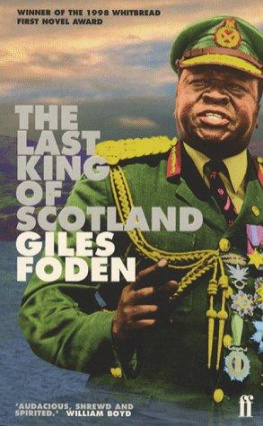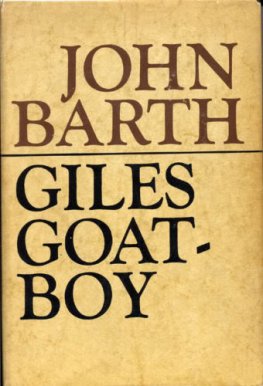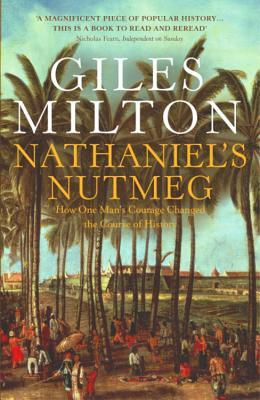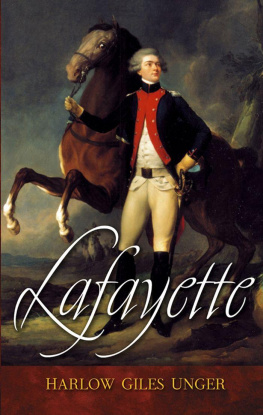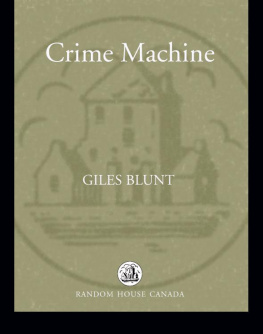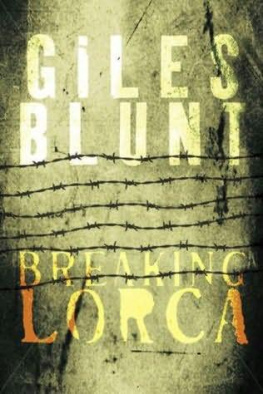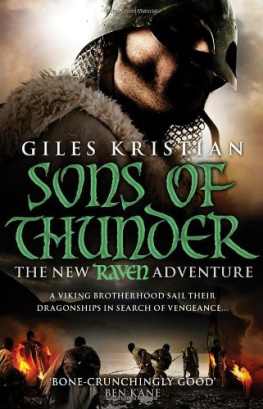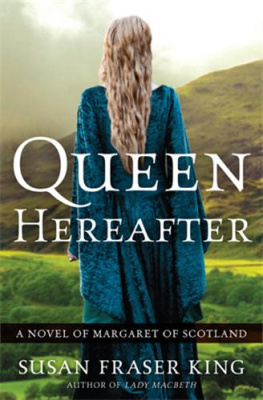Giles Foden - The Last King of Scotland
Here you can read online Giles Foden - The Last King of Scotland full text of the book (entire story) in english for free. Download pdf and epub, get meaning, cover and reviews about this ebook. year: 1999, publisher: Faber and Faber, genre: Detective and thriller. Description of the work, (preface) as well as reviews are available. Best literature library LitArk.com created for fans of good reading and offers a wide selection of genres:
Romance novel
Science fiction
Adventure
Detective
Science
History
Home and family
Prose
Art
Politics
Computer
Non-fiction
Religion
Business
Children
Humor
Choose a favorite category and find really read worthwhile books. Enjoy immersion in the world of imagination, feel the emotions of the characters or learn something new for yourself, make an fascinating discovery.
- Book:The Last King of Scotland
- Author:
- Publisher:Faber and Faber
- Genre:
- Year:1999
- Rating:3 / 5
- Favourites:Add to favourites
- Your mark:
- 60
- 1
- 2
- 3
- 4
- 5
The Last King of Scotland: summary, description and annotation
We offer to read an annotation, description, summary or preface (depends on what the author of the book "The Last King of Scotland" wrote himself). If you haven't found the necessary information about the book — write in the comments, we will try to find it.
The Last King of Scotland — read online for free the complete book (whole text) full work
Below is the text of the book, divided by pages. System saving the place of the last page read, allows you to conveniently read the book "The Last King of Scotland" online for free, without having to search again every time where you left off. Put a bookmark, and you can go to the page where you finished reading at any time.
Font size:
Interval:
Bookmark:
Giles Foden
The Last King of Scotland
1998
Combining elements of the thriller noir with comedy, this novel is based on the macabre events of Idi Amins regime, The Last King of Scotland being one of the many titles which the tyrant bestowed on himself. It is also about a young Scottish doctor who becomes involved in Amins administration.
I did almost nothing on my first day as Idi Amins doctor. I had just come in from one of the western provinces, where Id worked in a bush surgery. Kampala, the city, seemed like paradise after all that.
Back in my old neighbourhood, Id seen to Idi once. On his bullying visits to the gum-booted old chiefs out there, he would drive a red Maserati manically down the dirt tracks. Walking in the evenings, under the telegraph poles where the kestrels perched, you could tell where hed been the green fringe of grass down the middle of the track would be singed brown by the burning sump of the low-slung car.
On this occasion, hed hit a cow some poor smallholder had probably been fattening it up for slaughter spun the vehicle and been thrown clear, spraining his wrist in the process. The soldiers, following him in their slow, camouflaged jeeps, had come to call for me. I had to go and attend to him by the roadside. Groaning in the grass, Idi was convinced the wrist was broken, and he cursed me in Swahili as I bound it up.
But I must have done something right because, a few months later, I received a letter from the Minister of Health, Jonah Wasswa, appointing me to the post of President Amins personal physician Medical Doctor to His Excellency at State House, one of his residences. That was Idis way, you see. Punish or reward. You couldnt say no. Or I didnt think, back then, that you could. Or I didnt really think about it at all.
I explored the planes and corners of my gleaming office, which stood in the grounds of State House and came with a next-door bungalow thrown in. I felt rather pleased with its black couch and swivel chair, its green filing cabinets, its bookshelves stacked with medical reports and back issues of the Lancet, its chrome fittings and spring-loaded Anglepoise lamps. My immediate tools stethoscope, a little canvas roll of surgical instruments, casebook and so on were laid out tidily on the desk. The neatness and the general spotlessness of the place were the work of Cecilia, my nurse. She was a remnant from my predecessor, Taylor. After suffering my attentions at the roadside, Amin had summarily dismissed him. I knew I ought to feel guilty about this, but I didnt, not really. Cecilia made it quite plain that she didnt like or approve of me I reckon that she must have been half in love with old Taylor and that she soon would be going back herself, back to Ashford, Kent.
Let her go, I thought, pushing aside a paper on disorders of the inner ear: my private study, my little problem. I was just glad to be out of the bush and to be earning a bit more money. The sun was shining and I was happy, happier than Id been for a good many months. I stared out of the window at a cultivated lawn which swept down a hill towards the lake, glittering in the distance. A breeze moved the leaves of the shrubbery: bougainvillaea, flame-tree, poinsettia. Through the slatted blinds I could see a group of prisoners in white cotton uniforms, mowing the grass with sickles. They were guarded by a sleepy soldier, leaning on his gun in the dusty haze. Swish, swish, the noise came quietly through to me. I watched the prisoner nearest, slightly hypnotized by the movement of his cutter and the articulation of his bony arm. I shouldnt think they were fed too well: a bit of steamed green banana or maize meal, some boiled-up neck of chicken if they were lucky.
Turning away from the window, I resolved, since there didnt seem any likelihood of a presidential consultation that afternoon, to get a bus into town. I used to wear just shorts and shirt in the bush and needed to get a linen suit run up for tonight. The street-side tailors there were whole rows of them with their push-pedal, cast-iron Singers, their bad teeth and worse English, were just the fellows for the job. They could sort you out a suit in a couple of hours, while you looked round the market or went to one of the astoundingly understocked grocers. Not quite Savile Row, but good enough for here, good enough for Idi, anyway. Though he himself did wear Savile Row tailoring, with its luscious, thick lapels and heavy hem-drop. Zipped up in their polypropylene bags, the suits came in on the weekly flight from Stansted, hung on racks among crates of Scotch, golf clubs, radio-cassettes, cartons of cigarettes, bicycles tubed in cardboard, slimline kettles, sleek toasted-sandwich makers with winking lights. And plain things, too: sugar and tea products that might well have come from here in the first place, swapping their gunny sacks for cellophane packaging on the return trip.
I needed a suit quickly because this evening Idi was to host the Ambassadors Dinner, the annual beanfeast at which he entertained Kampalas diplomatic corps, assembled local dignitaries, senior civil servants, the wealthier concessionaires (Lonrho, Cooper Motors, Siemens), the top figures from the banks (Standard, Commercial, Grindlays) and tribal chiefs from all over the country. Wasswa, the Minister, had told me that His Excellency had given specific orders that I should attend. As you know, he had said (I had read Amins medical records, such as they were chaos really, since His Excellency insisted on editing them himself), President Amin occasionally suffers from a slight gastric difficulty.
As I shut the door of the office behind me, the draught from the corridor set the blinds tinkling, like little cymbals. The noise reminded me of something I once saw on holiday in Malta a set of tiny, shiny knives hung up like wind chimes outside a knife-grinders shop. Aeolian sharps, as a friend remarked at the time.
On my return from town, I took a shower in the concrete-lined cubicle in the bungalow. The big steel rose spurted out only a single stream of tepid liquid, under which I held up my hands, sending it spattering, planing down my back. Afterwards, as I went through the rough archway that separated the steamy bathroom from the sweltering bedroom, it was like going from one dimension to another. Fresh sweat mixed with the runnels of shower water.
I then found myself, irritatingly, needing to defecate, which I always hate doing just after a shower it seems like a form of sacrilege. As usual, I contemplated what I had produced: it was the easiest way of determining at an early stage the presence of a parasite, which could take hold in that fetid climate in a matter of hours. This evenings offering, I was worried to notice, was paler than usual, suggesting that bacteria had been absorbed into the bowel. I made a mental note to run some tests on myself in the morning.
The effort of expulsion had caused me to perspire even more, so when I put on my new suit I was already wearing what I used to call my African undertakers outfit: the envelope of moisture which covers the body day and night. This tropical monster, ghostly presage of a thousand sallow malarial deaths, squats on ones shoulders and then, trickling down, concentrates its peculiar force in the hollows of the knees and ankles.
It was in this morbid state that I strolled across the lawn to State House itself- hair brushed and shining none the less, a blue, short-sleeved shirt and natty green tie under the cream suit. On my way, I saw that the sicklemen were being herded into the lorry that would take them back to the gaol on the outskirts of town. One by one, the mowers disappeared through the canvas flaps, throwing their cutters into a wooden box below the tow-bar as they did so. Their guard lifted a short stick, acknowledging me as I passed.
Next pageFont size:
Interval:
Bookmark:
Similar books «The Last King of Scotland»
Look at similar books to The Last King of Scotland. We have selected literature similar in name and meaning in the hope of providing readers with more options to find new, interesting, not yet read works.
Discussion, reviews of the book The Last King of Scotland and just readers' own opinions. Leave your comments, write what you think about the work, its meaning or the main characters. Specify what exactly you liked and what you didn't like, and why you think so.

